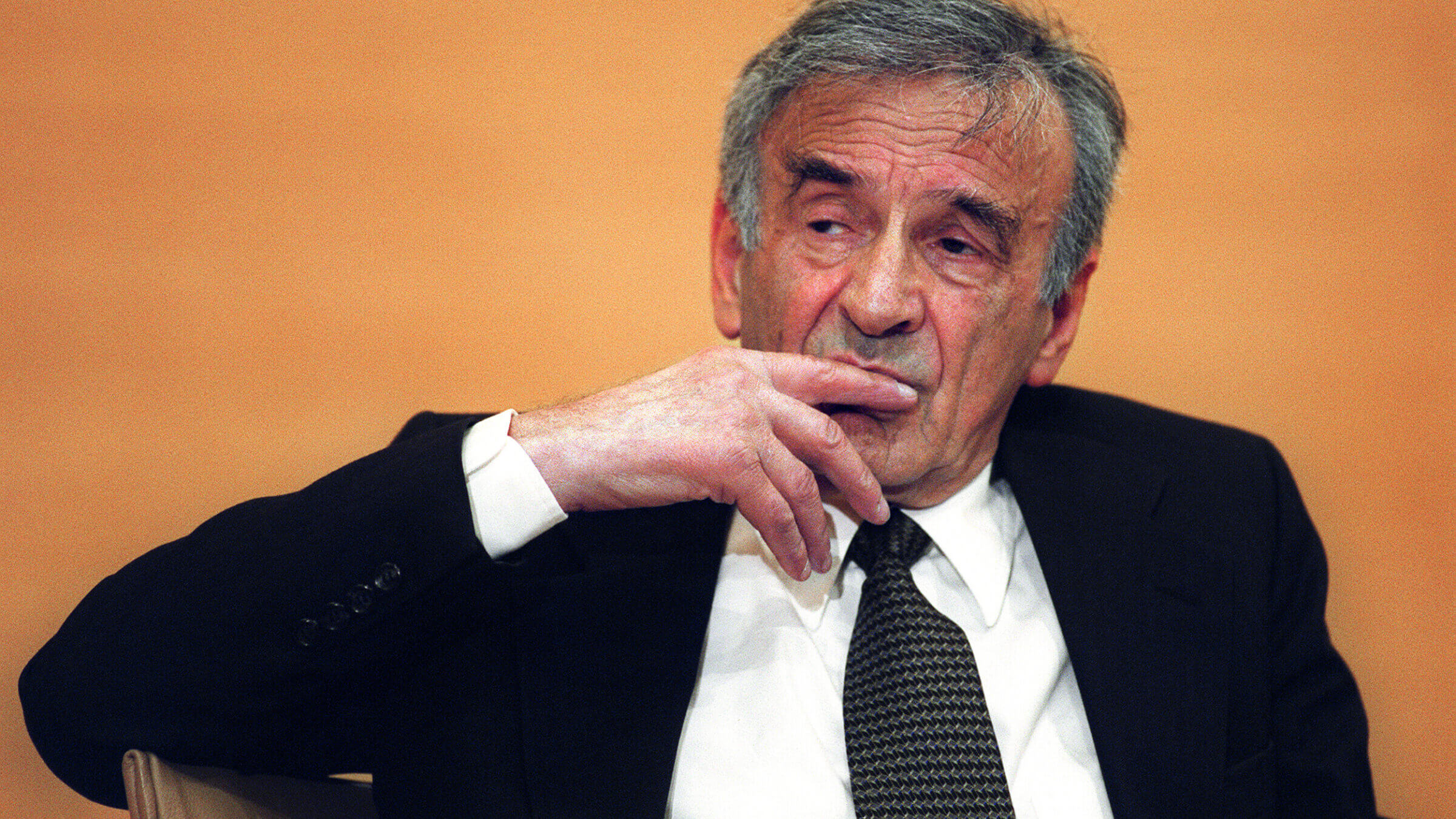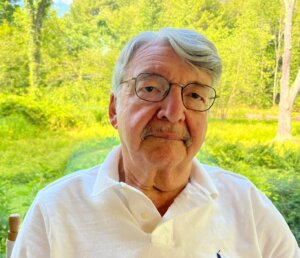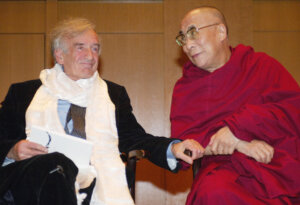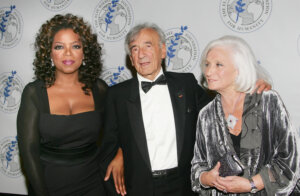In praise (and defense) of Elie Wiesel, who spoke with ‘the aura of a prophet’
Concisely chronicling the life and legacy of the Nobel laureate, Joseph Berger’s new biography is an indispensable touchstone

Elie Wiesel in Paris, 2001. Photo by Getty Images
Elie Wiesel: Confronting the Silence
By Joseph Berger
Yale University Press/Jewish Lives, 360 pages, $26
Enduring the horrors of the Nazi concentration camps, or even just contemplating them, destroyed religious belief for many Jews. “Never shall I forget those flames that consumed my faith forever,” Elie Wiesel famously wrote in his bestselling Holocaust memoir, Night.
But the reality of Wiesel’s faith was far more complicated. In the years after Auschwitz and Buchenwald, he may have doubted, may have argued with God and deplored his silence and absence. But Wiesel’s attachment to Jewish study and Orthodox ritual revived. It linked him to his childhood in Sighet, Romania (later, Hungary), and to his murdered relatives. In his final days, he embraced the possibility of a reunion in the afterlife with his parents and sisters.
So we learn from Joseph Berger’s intimate, sympathetic biography, Elie Wiesel, part of Yale University Press’s estimable Jewish Lives series. Berger, a former New York Times reporter and the Russia-born child of Polish Jewish refugees, knew Wiesel. Before Wiesel’s death in 2016, at 87, Berger had interviewed him for the Times’ obituary. The piece praised Wiesel’s mix of “moral urgency” and “magnetism” and described him as the person “who, more than anyone else, seared the memory of the Holocaust on the world’s conscience.”

Berger’s concise biography, both drawing on and fact-checking Wiesel’s own autobiographical writings, expands on those themes. He portrays the author, teacher, speaker and symbol with both fondness and candor. Where the evidence is mixed, he sides with Wiesel.
Berger defends Night from claims of fictionalization, noting the inevitable shortfalls of memory and the literary license associated with the memoir genre. He attributes Wiesel’s resignation of a leadership role in the creation of the U.S. Holocaust Memorial Museum in Washington to a philosopher’s discomfort with political jousting and the nitty-gritty of management, construction and fundraising. (“Elie probably couldn’t handle a kitchen renovation,” Berger said at a recent YIVO Institute for Jewish Research event.)
Berger reports on Wiesel’s public praise for the former film mogul (and now convicted sex offender) Harvey Weinstein before the #MeToo era, while omitting a charge of unwanted touching posthumously leveled against Wiesel himself. And he treats the apparent financial and political missteps of Wiesel’s later years with delicacy, blaming his physical infirmities and possible mild cognitive impairment (though Berger doesn’t use that term).
He begins with Wiesel’s childhood in Sighet, where Hasidic influences ran deep. That mystical, emotional strain of Judaism would continue to inform Wiesel’s thought and his fiction. In discussing Wiesel’s camp experiences, Berger foregrounds the centrality of his regrets — that he could not save his 7-year-old sister, Tzipora, from the gas, or prevent his father’s death on the eve of liberation.

He reminds us that the orphaned Wiesel, after his physical recovery from the camps, spent years as a journalist based in Israel, Paris (where he communed with Sartre and other intellectuals) and, finally, New York. That experience might explain Wiesel’s unusual accessibility to reporters even after becoming a world-historical figure and Nobel Peace Prize laureate.
Berger emphasizes Wiesel’s charm, his philosophical bent, his capacity for friendship, and the happiness he found with his wife, Marion, who became his preferred translator. (Fluent in multiple languages, including Hebrew and Yiddish, Wiesel continued to write mostly in French.)
But the biography also highlights his idiosyncrasies, including a preference for instant coffee, and makes it clear he was no saint, not even a secular one. Before his marriage, he could and did break hearts. He feuded with the great Yiddish writer Isaac Bashevis Singer. His relationship with his only child, Elisha, was at times strained, with the son struggling to flourish in the shadow of his father’s celebrity. (Both widow and son, as well as close friends, cooperated with the biography.)
Wiesel’s demeanor was humble; Berger describes him as “deeply human and unaffected.” But he had “a sensitive ego” and sufficient vanity to bewail what he saw as a lack of appreciation for his novels. Berger says that Wiesel aspired to win a literary Nobel, and to be classed with the Jewish trinity of Saul Bellow, Philip Roth and Bernard Malamud.

Elie Wiesel isn’t a critical study, nor does it aim to be. Berger touches only cursorily on Wiesel’s fiction. His focus, he writes, is on showing how Wiesel’s intellectual and personal gifts and lived experience intersected with the historical moment to heighten Holocaust awareness. Berger also offers detailed accounts of Wiesel’s influential campaign on behalf of Soviet Jews, his role in the controversy over President Ronald Reagan’s planned visit to Germany’s Bitburg military cemetery (with its SS graves), and his attempts to shorten the prison sentence of Jonathan Pollard, an American convicted of spying for Israel.
Wiesel taught for nearly four decades at Boston University, often focusing on “The Literature of Memory.” Over time, he became an indispensable speaker on the subject of the Holocaust, a beacon for survivors and their descendants. (He donated those lecture fees to a Jerusalem yeshiva dedicated to his father.) Berger also notes approvingly that Wiesel spent his moral capital to call attention to other genocides, as well as discrimination and injustice around the world, from Bosnia to South Africa.
“To his admirers,” Berger writes, “he had the aura of a prophet” who “spoke with simplicity about grand moral themes.”
But as he aged, Wiesel’s actions disconcerted some admirers. He grew close to the right-wing billionaire Sheldon Adelson and the controversial rabbi Shmuley Boteach (author of Kosher Sex) and expressed increasingly uncritical support for Israel. Against advice, he entrusted both his personal assets and those of the Elie Wiesel Foundation for Humanity to a single investment fund that happened to be run by the con man Bernie Madoff.
When news of Madoff’s Ponzi scheme broke in 2008, Wiesel attested to losing everything — a shocking turn of events for someone who already had lost so much. He took the blow, like so much else, philosophically. Berger offers some consoling follow-up. Thanks to generous donors, the efforts of a court-appointed trustee charged with recovering assets, and Wiesel’s own continuing employment, neither he nor the foundation was left destitute.
No doubt much more can be said about Wiesel’s variegated life and achievements. But Berger’s biography, lauding him as “a shining example of the human potential for resilience and recovery” who also insisted on remembering “the abominable events of the past,” will likely remain an indispensable touchstone.





















